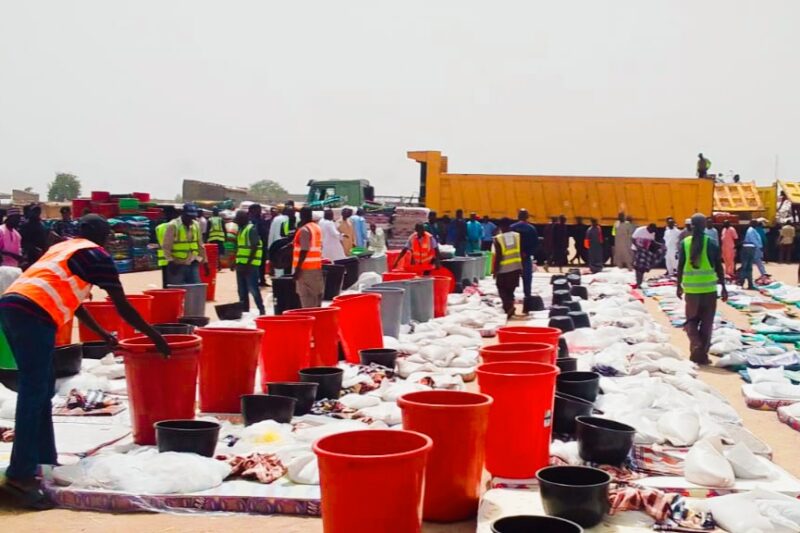Borno State governor says resettlement is voluntary and is being conducted in a dignified manner in line with the Kampala Convention, the African Union’s accord for the protection and assistance of displaced persons.
The Borno State government has begun the resettlement of 11,750 households – more than 70,000 internally displaced persons (IDPs) – from Muna camp in Maiduguri to their ancestral hometowns.
At least 645 households were relocated on Friday, June 7, to towns and villages in the Konduga, Bama, Gwoza, Jere, Ngala and Kukawa local government areas.
Borno State governor Babagana Umara Zulum said: “We are here to commence the closure of the camp. You recall that Borno State started the closure of official camps in Maiduguri three years ago. Therefore, we are here to flag off the commencement of the closure of this [Muna] camp.
“This resettlement is a voluntary one in line with the Kampala Convention,” he said, adding that the government had set aside almost ₦1 billion to support the relocation.
He said male- and female-headed households would each receive ₦100,000 and married women would get ₦50,000.
Each household would receive food, including maize and rice, and non-food items, such as mattresses, mats, oil and kitchen utensils.
Zulum said it was unfortunate that prostitution, drug abuse, procreation without care and criminal acts were common in Muna camp.
“I think people of Borno State will bear witness that this is one of the most notorious camps in Borno State. There’s a lot of prostitution ongoing in this camp; there’s a lot of procreation without care going on in this camp. And above all, there’s a lot of criminality that is ongoing in this camp – including theft and robbery.”
It was time for displaced people to return to their homes, he said, assuring inhabitants that the exercise would be carried out in a dignified manner in line with the Kampala Convention – the African Union’s accord for the protection and assistance of displaced persons on the continent.
Bukar Talba, a member of the lower chamber of the National Assembly who represents the Marte-Monguno-Nganzai constituency of Borno State, told RNI that preparations were being made to resettle the remaining displaced people in the camp, which would be closed once all inhabitants had been resettled.
“We have successfully concluded relocating 645 households. Displaced people originally from Mafa, Dikwa and Marte, who make up the majority of IDPs in the camp, will be resettled next.
“The state government has constructed houses and other critical infrastructure, such as health facilities and schools, in the ancestral hometowns, just as it did for displaced people who were resettled in Dalori in the Konduga Local Government Area.”
Talba said the resettlement was voluntary.
“These IDPs want to return to their ancestral homes. The state government has provided all the necessary humanitarian assistance they need, including food and non-food items, such as mattresses, mats, pots and other kitchen utensils.
Talba said displaced people who were relocated on Friday had already received their money.
He urged those people being resettled “to be resilient and courageous” and to go back to their old way of life.
“If they go back to farming or other businesses, they will be able to make a sustainable livelihood which they have been unable to do in Muna camp.”
Modu Hassan, a displaced man originally from the Konduga Local Government Area of Borno State, told RNI that he had been living in Muna camp for almost eight years.
“I used to be a farmer. I lived in the agrarian community of Shettimari in Konduga before attacks by insurgents forced us to flee. Living in Muna camp has been hard. I could not farm and could not make a living.
“We are happy to be going back to our ancestral homes and we are grateful to the Borno State government for arranging the resettlement. All we want is to go back home, tend to our farmlands and live peacefully.”
Zara Sale, a displaced woman originally from the Gwoza Local Government Area, said she had spent almost 10 years in Muna camp.
“It has been a struggle. There was never enough food and clean drinking water. We did not have proper houses or shelters and we did not have access to healthcare services. Our children could not go to school. Our living conditions were poor.
“I am excited to return to my ancestral hometown in Gwoza.
“The only problem is security. I am appealing to the government to provide adequate security so that we will be safe. We need to be able to work and farm without any hindrances. We want to go home but our safety must be assured.”
Bintu Modu, originally from the Jere Local Government Area, confirmed that she had been given cash, food and non-food items, such as mattresses and mats, as well as cooking oil and kitchen utensils, as part of the resettlement agreement.
“I spent almost nine years in Muna. It was hard and our living conditions were extremely poor. Now I’m very happy to be returning to my hometown where I will be able to farm. At long last I will have a sustainable means of making a living. It will be like it was before the insurgency. I just pray it is safe to return home.”
SHETTIMA LAWAN MONGUNO








